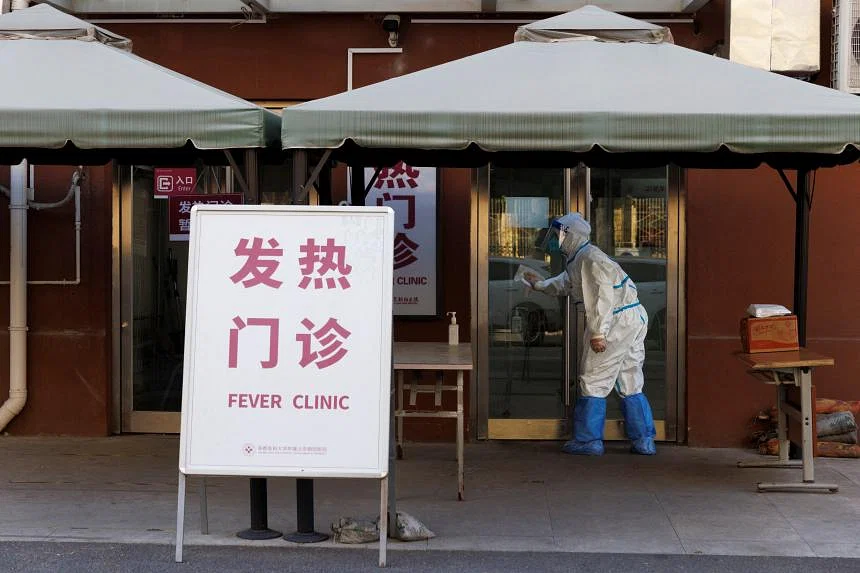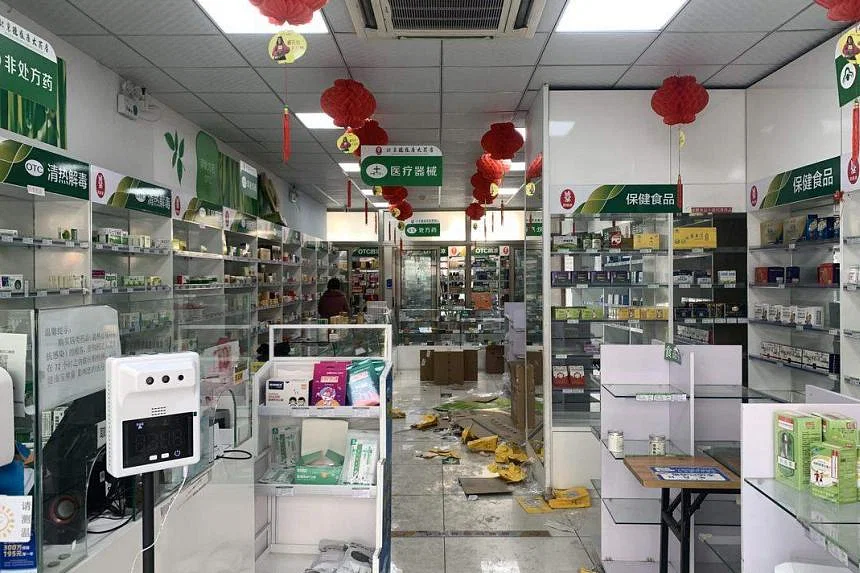December 13, 2022
BEIJING – Days after most of its Covid-19-related measures were lifted, a massive outbreak has forced parts of Beijing into voluntary quarantine, with hospitals overwhelmed, pharmacies out of cold and fever medication, and well-oiled delivery networks pushed to their limits.
Amid the capital city’s worst air pollution in a year, scores of people were seen lining up to enter hospitals to get to designated “fever clinics”, in spite of the authorities urging anyone running a temperature to stay home and self-medicate.
According to the Beijing municipal government, about 22,000 people went to such clinics on Sunday alone, 16 times the number from the previous week.
But given the run on antipyretics and other medicine to treat symptoms, going to a hospital appeared to be the only option for some.
Hospitals in several cities, including Beijing and Guangzhou, are struggling to keep up with the outbreak.
In one hospital in the capital city, nearly 20 per cent of doctors were off duty because of infections, a physician told Caixin magazine.
In Wuhan, some designated Covid-19 hospitals had to shut because they simply could not cope, the report said.

Scores of people were seen lining up to enter hospitals to get to designated “fever clinics” in Beijing. PHOTO: REUTERS
Under new rules issued last week, those who test positive but have mild symptoms are allowed to quarantine and recover at home.
While most who get Covid-19 tend to experience mild or moderate symptoms, the expectation that some 60 per cent of China’s 1.4 billion will be infected in this wave means that the sheer number can still be overwhelming.
“We have some cold medication at home, but I don’t have any anti-fever drugs, and I can’t buy any online. So coming to a hospital is the best since they won’t run out of medication,” said a resident known only as Ms Jiang, 32, who had been queueing outside a hospital in the populous Chaoyang district.
She told The Straits Times over text messaging that some of her neighbours managed to get fever and cold medication through resellers at a high price, but she chose not to because she was unsure of the quality.
She also said her Covid-19 test results are not reflected yet on a tracking app after two tests over the weekend, and she did not have any antigen rapid test (ART) kits. A run on ART kits has meant online orders often get cancelled or are not processed.

Empty shelves at a pharmacy in Beijing’s Dongcheng district. ST PHOTO: DANSON CHEONG
Health officials have also urged residents to “buy medicine reasonably” instead of hoarding, while also reminding them not to “over-medicate” and to “take medicine responsibly”.
They said the stock crunch is temporary and that it will soon be resolved.
Grocery stores and restaurants are also dealing with a manpower shortage or have been forced to shut after staff tested positive.
Over the weekend and on Monday, bags of groceries lined the floors in several supermarkets, awaiting pickup by delivery riders, who are also in short supply because many have fallen ill.
“Some of these orders are to places nearly half an hour away because of a glitch in the system, and many riders don’t want to go there either, so we’re left with these bags here waiting for hours,” a supermarket employee said.
Boxes of new produce were stacked along aisles, arriving faster than staff could restock shelves.
An outbreak at local logistics distribution centres meant that online shopping, the lifeblood of Chinese consumers, has been met with delays. At one such centre in Dongzhimen, parcels piled up 2m high across nearly four parking spaces.
Meanwhile, the authorities continued to ease measures across the country, with a travel tracking app function to be scrapped from Tuesday, and cities like Shanghai completely doing away with classifying “risk areas”.
In Wuhan, the original epicentre of the virus, there is an outbreak under way, but residents appear slightly more sanguine.
“We’ve gone through this before, and after seeing what the rest (of the world) has gone through, I knew to always be prepared,” said boutique owner Li Yangyang, 53.
“I don’t want to go through another 2020, when it felt like I had no control over any part of my life, not even what I ate.”


